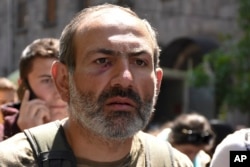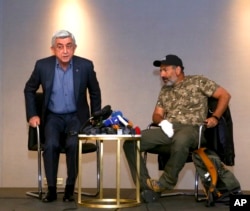Armenian Prime Minister Serzh Sargsyan resigned unexpectedly Monday after days of protests against him by opposition supporters who claimed he was clinging to power after serving the maximum 10 years as president.
"The street movement is against my tenure. I am fulfilling your demand," he said in a statement.
Thousands of people cheered his resignation in the streets of the Armenian capital, Yerevan, the 11th day of demonstrations. Hundreds of soldiers joined the anti-government protesters in celebrating. Motorists honked their horns and Armenians hugged and kissed each other.
The 63-year-old Sargsyan's resignation came shortly after the release of opposition leader Nikol Pashinyan.
Pashinyan was arrested Sunday as he participated in a demonstration that began after Armenia's ruling party last week elected Sargsyan prime minister, after a decade serving as president.
Pashinyan had said he would like the demonstrations to be the "start of a peaceful velvet revolution" — a reference to the 1989 protests that ended communist rule in Czechoslovakia.
The country's prosecutor general said Pashinyan and two other opposition politicians "were detained as they were committing socially dangerous acts."
After Sargsyan was named prime minister, the demonstrations intensified, with about 15,000 people rallying last Wednesday at Yerevan's central Republic Square. Some held posters that read, "Make a step and reject Serzh." The anti-government protests swelled to 50,000 people on Sunday.
A meeting Sunday between Sargsyan and the 42-year-old Pashinyan was held with the aim of ending the continuing anti-government protests. But Sargsyan walked out of the meeting when Pashinyan told him he came to discuss his resignation, to which the prime minister responded, "This is blackmail."
Sargsyan had previously said he would not seek to be elected as prime minister as his presidential term ended and was viewed as reneging on that promise by becoming premier.
But as he quit, Sargsyan said, "Nikol Pashinyan was right. I was wrong."
Sargsyan was nearing the end of his second and final term as president earlier this year when the country moved from a presidential to parliamentary system.
The new system empowers the position of the prime minister, which does not face term limits, making it more powerful than the president, who is now more of a figurehead.
Responding to the latest developments, a State Department spokesman thanked Sargsyan "for his many years of service and his contributions to the strong U.S.-Armenia partnership." "We expect the democratic process to determine his successor will be conducted in a transparent manner, consistent with Armenia’s laws and international obligations, and we look forward to working closely with the new government," the official added.
Kremlin spokesman Dmitry Peskov said Russia was "very attentively observing what is happening in Armenia," which was once a Soviet satellite country that has retained close ties to Moscow.
Peskov called the South Caucasus country "extremely important" for Russia, but he rebuffed a question about whether Russia would attempt to interfere, saying the Yerevan political dispute was "exclusively an internal affair."
VOA's Nike Ching contributed to this report from the State Department.







